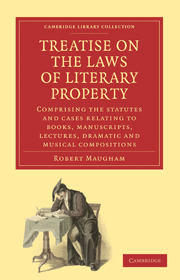 Treatise on the Laws of Literary Property
Treatise on the Laws of Literary Property Book contents
- Frontmatter
- LAWS OF LITERARY PROPERTY
- ANALYTICAL TABLE OF CONTENTS
- BOOK I HISTORICAL VIEW OF THE LAW
- FIRST PART. OF THE DURATION OF COPYRIGHT
- SECOND PART. OF THE LIBRARY TAX
- BOOK II THE PRESENT STATE OF THE LAW
- BOOK III DISQUISITIONS ON THE PRINCIPLES OF THE LAWS AND THEIR EFFECT ON LITERATURE
- NOTES, COMPRISING AUTHORITIES REGARDING THE LIMITATION OF COPYRIGHT, AND THE LIBRARY TAX
- TABLE OF CASES CITED OR REFERRED TO, AND WORKS OR SUBJECTS LITIGATED
- INDEX
- ERRATA
FIRST PART. OF THE DURATION OF COPYRIGHT
Published online by Cambridge University Press: 05 August 2011
- Frontmatter
- LAWS OF LITERARY PROPERTY
- ANALYTICAL TABLE OF CONTENTS
- BOOK I HISTORICAL VIEW OF THE LAW
- FIRST PART. OF THE DURATION OF COPYRIGHT
- SECOND PART. OF THE LIBRARY TAX
- BOOK II THE PRESENT STATE OF THE LAW
- BOOK III DISQUISITIONS ON THE PRINCIPLES OF THE LAWS AND THEIR EFFECT ON LITERATURE
- NOTES, COMPRISING AUTHORITIES REGARDING THE LIMITATION OF COPYRIGHT, AND THE LIBRARY TAX
- TABLE OF CASES CITED OR REFERRED TO, AND WORKS OR SUBJECTS LITIGATED
- INDEX
- ERRATA
Summary
CHAP. I.—FROM THE INVENTION OF PRINTING, TO THE STATUTE 8 ANNE, 1710
SECT.I.—Of the definition and nature of Literary Property
Literary Property, or Copyright, may be defined to be the ownership or rightful possession to which an author, or the person to whom he assigns it, is entitled in the copy or original manuscript of his literary works; and it comprises the exclusive right of printing and publishing copies of any literary performance, including engravings, musical compositions, maps, &c.
Lord Mansfield adopted the word “copy” in the technical sense in which, he said, that name or term had been used for ages, to signify an incorporeal right to the sole printing and publishing of something intellectual, communicated by letters.
Mr. Justice Aston also observed, that “the copy of a book seemed to have been not familiarly only, but legally, used as a technical expression of the author's sole right to print and publish: and that these expressions in a variety of instruments were not to be considered as the creators or origin of that right or property, but as speaking the language of a known and acknowledged right; and, as far as they were active, operating in its protection.
The right of an author to the exclusive use and publication of his own literary compositions, is classed by Sir W. Blackstone amongst the species of property acquired by occupancy, being grounded on labor and invention.
- Type
- Chapter
- Information
- Treatise on the Laws of Literary PropertyComprising the Statutes and Cases Relating to Books, Manuscripts, Lectures, Dramatic and Musical Compositions, pp. 1 - 40Publisher: Cambridge University PressPrint publication year: 2010First published in: 1828
